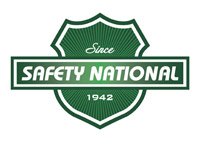Share This Article:

Automated External Defibrillators (AED) have certainly been in the news. Quick use of an AED was able to bring football player Damar Hamlin back to life after suffering cardiac arrest on the field. For that one success story, however, there is an alarming amount of reports of deaths due to an AED not being used in time because people did not know where to locate it.
Do your employees know where your Automated External Defibrillator (AED) is located? If so, do they know how to use it? According to the American Red Cross, 436,000 people die each year in the U.S. due to cardiac arrest. According to U.S. Occupational Safety & Health Administration (OSHA), there are about 10,000 cardiac arrests in the workplace annually.
“Doing cardiopulmonary resuscitation (CPR) and using an AED in the first few minutes of a cardiac arrest can drastically improve survival rates, said Sara Gibson, Senior Risk Services Manager at Safety National. “Studies have shown with immediate defibrillation there is a 60% survival after a cardiac arrest, compared to waiting for emergency personnel, which has a 5-7% survival rate.”
Causes of cardiac arrest in the workplace can be from a heart attack, electrocution, or asphyxiation (loss of consciousness and death caused by inadequate oxygen in the work environment, such as confined space). Many workplaces are also open to the public such as schools, restaurants, and retail establishments. Employees should be prepared to come to the aid of co-workers, customers, and guests.
According to the American Heart Association, only 50% of people can locate an AED in the workplace. The CDC encourages having Public Access Defibrillation (PAD) programs to ensure life-saving access to AEDs.
According to the CDC, the recommended attributes of a comprehensive PAD program include:
- Targeted automated external defibrillator (AED) site placement
- Training anticipated responders
- Emergency medical services (EMS) coordination
- Emergency response plans
- Routine maintenance and testing of AEDs
- Continuous quality improvement
- Limited civil liability or qualified immunity
There are several ways to obtain training for CRP/AED. Both the American Heart Association and the American Red Cross have nationwide classes offered both in person and online formats.
Courtesy of Safety National
california case management case management focus claims compensability compliance courts covid do you know the rule emotions exclusive remedy florida FMLA fraud glossary check health care Healthcare hr homeroom insurance insurers iowa leadership medical NCCI new jersey new york ohio osha pennsylvania roadmap Safety state info technology texas violence WDYT west virginia what do you think women's history women's history month workcompcollege workers' comp 101 workers' recovery Workplace Safety Workplace Violence
Read Also
About The Author
About The Author
-
Safety National
Safety National is a leading provider of alternative risk funding products such as excess workers’ compensation, deductible casualty, loss portfolio transfers and reinsurance. Safety National is a strong supporter of industry education and our thought leaders are frequent speakers at conferences around the nation. Safety National is a member of the Tokio Marine Group and is rated “A+” (Superior), Financial Size Category XII, by A.M. Best. To learn more, visit: www.safetynational.com.
More by This Author
- Jul 16, 2023
- Safety National
Read More
- Apr 03, 2025
- Shawn Deane
- Apr 01, 2025
- NCCI
- Mar 30, 2025
- Kim Radcliffe
- Mar 29, 2025
- Natalie Torres
- Mar 19, 2025
- NCCI
- Mar 16, 2025
- Derek Goff




